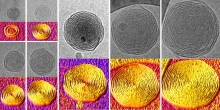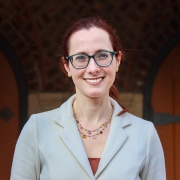Penn Team Creates Stable Vesicles for Time-Released Drug Delivery

One of the defining features of cells is their membranes. Each cell’s repository of DNA and protein-making machinery must be kept stable and secure from invaders and toxins. Scientists have attempted to replicate these properties, but despite decades of research even the most basic membrane structures—known as vesicles—still face many problems when made in the lab. They are difficult to make at consistent sizes and lack the stability of their biological counterparts.
Now, University of Pennsylvania researchers have shown that a certain kind of dendrimer, a molecule that features tree-like branches, offers a simple way of creating vesicles and tailoring their diameter and thickness. Moreover, these dendrimer-based vesicles self-assemble with concentric layers of membranes, much like an onion.
By altering the concentration of the dendrimers suspended within, the researchers have shown that they can control the number of layers, and thus the diameter of the vesicle, when the solution is injected in water. Such a structure opens up possibilities of releasing drugs over longer periods of time, with a new dose in each layer, or even putting a cocktail of drugs in different layers so each is released in sequence.
The study was led by Virgil Percec, P. Roy Vagelos Professor of Chemistry. Also contributing to the study were Shaodong Zhang, Hao-Jan Sun, Andrew D. Hughes, Ralph-Olivier Moussodia and Annabelle Bertin, all members of Percec’s lab, and Professor of Physics and Astronomy Paul Heiney.
Their study was published in Proceedings of the National Academy of Sciences.
Read the full story here.





